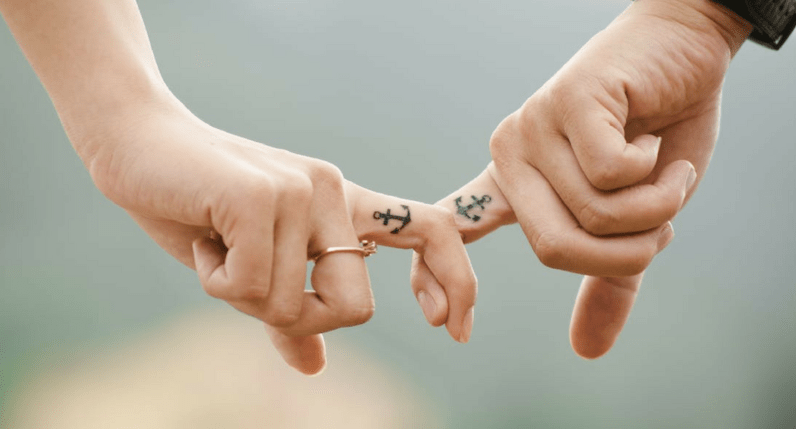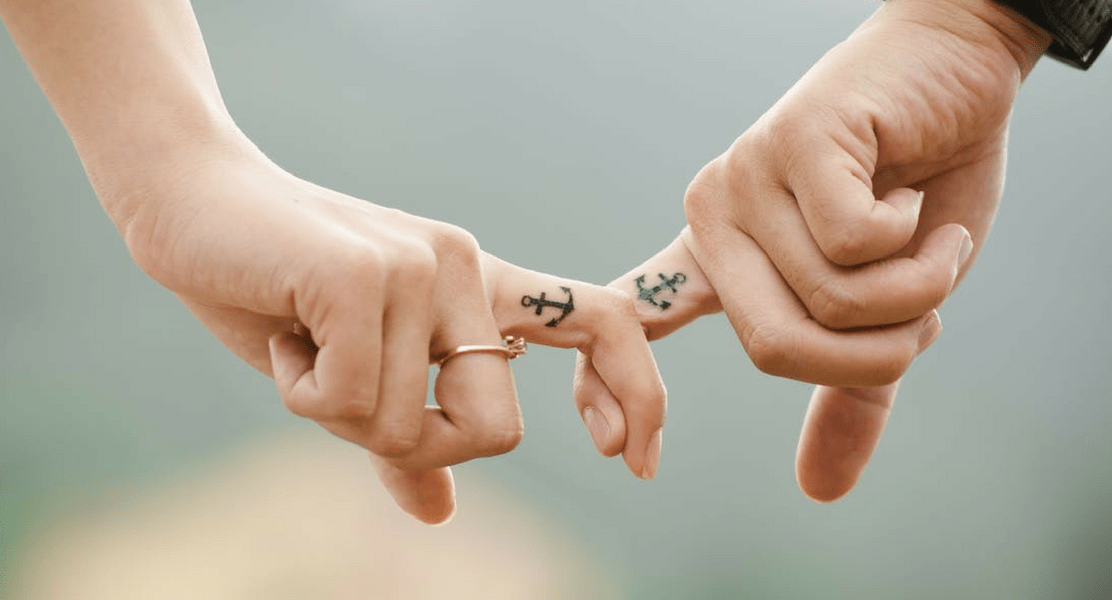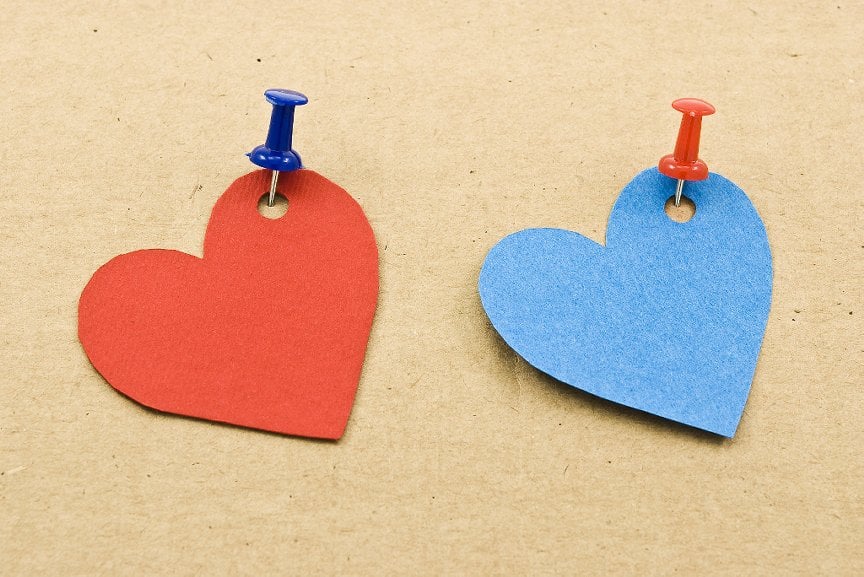What’s Your Attachment Style (+ How It Affects Finding The One)?

Ready to Attract the Love You Deserve?
Have you ever wondered why you act the way you do in a relationship, and where that behavior comes from? That jealous monster that pops up when your significant other is late after work doesn’t come out of thin air, nor does your Bambi-like trust of everyone you date.
It’s a scientific fact: your past relationships and how you attached to people you cared about previously in your life has a huge impact on how you’ll be in romantic relationships. Your past, in fact, defines your attachment style.

How you attach to your mate tells a lot about you.
As a child, maybe you were alone a lot and felt anxious when your parents left you home by yourself. Or maybe you had a loving and safe relationship with your family. Perhaps you were abused in some way, and now have trouble trusting people.
Whatever your history, it’s important to understand that it affects your present, and your ability (or inability) to love.
In fact…if you’ve had trouble finding love, it might be because of your attachment style. If you’re not aware of what your attachment style is, then you can’t know how to look for someone whose own style complements your own.
Consider this as your guide to understanding what your attachment style is, as well as how to be in a relationship with a guy who has a particular style that works well with your own.
Whoa. Back Up. What is an Attachment Style?

Two paper hearts become one.
Scientists are always coming up with something useful, aren’t they? In the 1960s, several psychologists, including John Bowlby and Mary Ainsworth conducted research on babies that showed that humans express one of three primary types of attachment, and that their upbringing greatly affects how they form relationships with others throughout life.
There are three attachment styles that define how people love and respond to others, and we’re going to explore each in this article.
Understanding your attachment style can give you insight into why certain things always bug you with a partner, or why you seem to attract a certain kind of man over and over (for better or worse).
Knowing the characteristics of each attachment style can help you quickly identify which one the object of your desire is, and you can decide whether you’re up for dating, say, someone with an avoidant attachment before things get serious.
I know, I know. You’re chomping at the bit to find out more about attachment styles. What are we waiting for?
The Secure Attachment Style: Based on Trust

Couples who are secure trust one another.
Bethany’s childhood was very “Leave it to Beaver.” Her parents have been happily married for 45 years, and she’s close to her brothers. Her parents supported her as she explored the world around her, and she grew up with a good sense of self.
Bethany made friends easily and has stayed friends with her junior high crew. She’s got solid self-esteem.
Trust is not an issue for her.
When Bethany is in a healthy relationship, she gives her love easily and respects her partner. She’s willing to compromise when needed, and is okay with having boundaries with her guy. Her relationship is about being give-and-take: sometimes she’s in the driver’s seat, and sometimes he is.
Are you like Bethany?
If so, congrats. The secure attachment style is the gold standard when it comes to attachment styles. We all aspire to have this style, and half of us do. You may operate with the secure attachment style until something traumatic happens…or you might evolve from one of the following styles once you’re in a better place in your life.
If you don’t identify with Bethany, don’t worry. It’s absolutely possible to change your attachment style with a little introspection and hard work.
What to know about dating guys if this is your style:
You’re trusting, and generally that’s a good thing, but do go slow. Not every guy deserves your trust right away, and he definitely should earn it. You may be guilty of trusting everyone, which may get you hurt. Just protect your heart.
What if you keep attracting guys with this style?
Then celebrate. This is a well-rounded guy who isn’t afraid to express himself with you. Not every man with the secure attachment is a knight in shining armor, but you can be relatively sure he doesn’t come with a ton of emotional baggage that will interfere with your relationship.
What if you’re secure and he’s anxious or avoidant?
When you start dating across attachment types, you can be sure that you’ll need to have conversations to ensure that you and your partner are on the same page. If you’re dating someone who has the anxious attachment style, he may need constant reassurance that you care about him. He may get jealous easily. Make sure you text or call him frequently and let him know that you only have eyes for him.
If his anxiety gets out of hand, that’s when an imbalance in the relationship can occur. Consider whether you’re willing to put in the work to reassure him. It can take a lot of energy to do so.
If you’re dating someone with the avoidance attachment style, realize that while you feel secure in professing your feelings — or even frustration from time to time — he may pull into his shell to avoid any sort of emotional discussions.
If you’re just starting to date an avoidant, he may make it clear that he’s not looking for anything serious. If you’re okay with casually dating him and never being in a committed relationship, proceed. Otherwise, move on.
Anxious Attachment: Insecurity and Jealousy May Arise
Not everyone had a magical childhood like Bethany. Lizzie felt insecure and unsteady as a child after her parents divorced. She became a latchkey kid when her mom went to work full time. She hated the smelly old lady who babysat her and would hide from her in her room.
These days, Lizzie worries a ton about her relationships. She overthinks what could go wrong, which puts her at a disadvantage because she can’t focus on the wonderful opportunity to get to know any guy she’s dating. She’s even jeopardized several great relationships because of her insecurities.
Lizzie often feels possessive or even jealous if her man, for example, goes out with his friends (female buddies included). She sometimes flies off the handle at imagined offenses, always assuming the worst.
Lizzie doesn’t like being alone, which has led her to end up in several Good Enough relationships. She finds it hard to trust, or even open up to anyone, and she constantly worries about being abandoned, so she stays, even when she shouldn’t.
Lizzie is far from alone in terms of women (and men) who let this anxious attachment style get in the way of love. Think of all the Fatal Attraction-type stories you’ve heard of people threatening to kill themselves if their lovers left. Or calling and hanging up over and over. Cooking a kid’s pet rabbit.
All signs of the insecurity that comes with the anxious relationship attachment style.
Maybe it even describes you. Without reassurance that your boyfriend is happy with you, it can be all too easy to go off the rails, texting a dozen times a day, in an effort to get him to respond.
What do you think his response will be after all those texts? Not good, you can bet.
What to know about dating guys if this is your style:
Realize that some of your insecurities will be unfounded. In fact, most will be, I’m willing to bet.
Before you start accusing your guy of cheating because you saw him with another girl (who, ahem, turned out to be his cousin), take a breath and figure out how to approach the conversation without being accusatory.
Try to put the worry on the back burner so you can actually enjoy your relationship in the moment.
Realize that manipulating your man will not get the results you want. It will, in fact, send him running for the hills.
What if you keep attracting guys with this style?
If you find yourself dating someone with the anxious attachment style, you have two choices:
- If you date a guy who is unjustifiably jealous of you, you can avoid doing things that set him off, but that’s like walking through a minefield.
Every time you go play basketball with your boys or have dinner with a male friend, know that you’ll likely tip the balance and cause him to be anxious. Should you stop hanging out with your guy friends just to keep this man? Is he worth it?
Or…
- You can ditch him. Because you want a guy who trusts you. And you will never change this one.
Now, this isn’t to say you can’t have a happy and healthy relationship with someone with the anxious attachment style. But it depends on how well he has his insecurities under control, and how willing he is to work on his issues. While you shouldn’t expect to change a man, you can hope that he will want to let go of his anxiety and jealousy in order to be a good partner to you, you fabulous, sexy woman.
What if you’re anxious and he’s secure or avoidant?
In this case, you’re the one who needs to work on letting go of your worries and insecurities for the greater good of your relationship. See your behavior from his perspective: if he hasn’t called all day and your inclination is to assume he’s with another woman, is stalking him at work going to show that you trust him?
Realize that this world can’t — and shouldn’t — revolve around you.
He didn’t call all day because he was stuck in a meeting at work. But as soon as he got out, he texted you to let you know he was thinking of you.
Be clear about what you need. If you want to hear from your man every day, let him know how good it feels to get a text from him. That’s a better approach than crying when you don’t hear from him.
If you’re dating an avoidant, realize this combination is often called a toxic relationship because it’s so challenging to find common ground between these polar opposite attachment styles. You seek affirmation while he distances himself from you. The more he pulls away, the harder you squeeze.
Again, communication is going to be your ally. Make your needs known, and do your best to understand and accommodate what he needs from you.
Avoidant Attachment: Both Dismissive and Fearful

Being in a relationship with someone who is avoidant can be challenging.
As a child, Veronica’s family never expressed love. She was sexually abused by a family member, and ever since, has never learned a healthy way to attach in relationships.
Not everyone who follows the avoidant attachment style has been abused, so don’t discount it if your childhood wasn’t so heartbreaking. You simply may have never formed close attachments in your past, and may still have trouble doing so.
With the avoidant attachment style, there are two sub-attachment types:
- Dismissive-Avoidant
- Fearful-Avoidant
If you’re the dismissive-avoidant attachment style, you might feel like you don’t need anyone, that you’re fine alone.
You might avoid intimacy because it makes you vulnerable. Maybe people say you’re afraid of commitment, though you scoff at that. You might prioritize everything else — friends, work, school, travel — above having a romantic partner.
You may hate being touched, which can be a relationship-killer in the bedroom.
When you’re in a relationship, you may quickly find fault with your partner, à la Seinfeld (“she’s got man hands!”) so that you avoid the stress of intimacy. Few men stand a chance of making it through your filters, since they’re set so high.
With the fearful-avoidant attachment style, you may crave intimacy…but also fear it.
I love you!
No, get away!
You may find it hard to be close to people and let them in, both friends and lovers, though deep down you want to connect. You want a relationship, but it’s your past — whatever trauma or detached upbringing you experienced — that’s telling you if you get close, you will get hurt.
You may find yourself in dramatic relationships where you argue or even break up and get back together often. You might even end up in an abusive relationship, so be careful.
What to know about dating guys if this is your style:
Ideally, you will move away from the avoidant attachment and toward something more healthy like the secure attachment style.
You need to work on opening up to caring for people as well as trusting them. You want to be in a relationship, so you just need to get your head and your heart aligned so the soap opera in your head will silence.
It’s okay to be vulnerable.
Yes, you will get hurt at some point, but know that this is normal. Everybody hurts, as REM said. But you’ll always heal and move on to better things.
What if you keep attracting guys with this style?
One minute he’s holding you close, and the next he ghosts for a week. You don’t need this roller coaster in your life. You may not know what drama lurks in his past, but realize that it’s not up to you to heal this guy. You may be better off moving on.
But hold on.
While some argue that the avoidant attachment style can be the most challenging, it doesn’t have to be a dealbreaker. In fact, there are reasons why a man with the avoidant attachment type could be your best mate.
First off, because it takes him a while to trust and open up, he won’t rush into the relationship. Which is a good thing, because it gives you both time to be sure that this is what you really want.
Editor’s note: Ready to attract love with a proven strategy? Watch this free video to learn the 7 powerful steps
If you’re the secure type and value your independence, there’s no better partner, because the avoidant is all about independence. As you each cultivate your own interests, you don’t become “that chick” who gives up who she is and her interests for a man.
Not even an option.
It all boils down to just how avoidant your fella is, and how it jibes with your own personality. If you’re secure in who you are as a partner and an individual, his avoidant personality might not be so bad.
What if you’re avoidant and he’s secure or anxious?
Likely, dating a secure type can work out, as long as he’s okay with your need to distance yourself from him (or if you’re willing to work on that so you can get closer to him).
Unfortunately, the avoidant-anxious attachment combination is the most lethal of all relationships. If you’re dating someone who constantly needs reassurance that you can’t or don’t want to give, you might feel good knowing that he’ll be around, no matter how you treat him.
Not a great foundation for a solid relationship.
Look to your past to uncover why you feel detached from your romantic relationships. Ask yourself what you fear. Being hurt is a common fear, whether we’re the avoidant attachment style or not. Work through that fear so that you don’t miss out on the potential for great love.
Changing Your Attachment Style

Working on your attachment style is the key to successful relationships.
I’m a big proponent of fixing what’s broken internally. If you’re unhappy with the attachment style you currently operate under, then change it.
Now, this may be a huge undertaking, I realize. If you’ve experienced serious trauma, please talk to a licensed therapist. No blog article is going to magically repair that damage.
But you’re worth it, aren’t you?
Don’t you feel like you are entitled to experiencing love without jealousy, without fear of pain, without worry?
You are, my dear.
And so it’s worth investing the time and energy into changing how you are in a relationship. Ask yourself what you fear. Ask yourself what you need. Then communicate it.
One of the biggest causes of relationship failure I’ve seen is a lack of communication. If you don’t express that, for example, you’d like to hear from your guy after he goes out with his lady friends from high school as a way of reassuring you that everything’s okay, you can’t get angry when he doesn’t call.
Or if you feel like your guy is smothering you and all you want to do on Sunday afternoon is curl up alone with a good book…tell him.
Because the key to a successful relationship — regardless of attachment style — is telling your partner what you want and need.
If you want to move toward a more secure attachment style, pay attention to the characteristics that secure people possess. Ask yourself why your response to a given situation (haven’t heard from him all day) is so different from a secure person’s, then consider what mindshifts you need to make to change.
Conclusion: You Aren’t Limited by Your Attachment Style
Understanding your attachment style may explain why certain past relationships ended the way they did. Or why you keep going for the same type of guy.
Why do you keep dating that tattooed bad boy cheater over and over again (though with a different name and piercing each time)?
It might be because you’re fearful-avoidant (and he is too), and you know he’s never going to want to commit, which keeps you safe.
Why does every relationship seem to end in explosive arguments and anger?
Maybe you, as an avoidant, keep dating anxious types, which you now know can be a lethal combination.
It’s good information to have.
But knowing what your current attachment style is right now in no way limits your options for love. It simply gives you something to work toward (that secure style) and helps you better identify who’s a good fit for you, and who isn’t worth your time.
The more you know yourself, your needs, and why you react the way you do to relationship situations, the better equipped you are to find that one perfect person for you.




I needed to read this. I’m quite logical, analytical, sensitive and emotional. My biggest weakness is ovetthinking and it definitely has done damage to my love life.
Hi Adam,
Im kind of a wall flower- you know the one thats a great pal because shes mechanically onlined and does “tom boy” stuff. I dont seem to attract anything but Beta males and i hate it. When a man does come along that isnt he turned outto suffer from a narcissistic personality disorder. What do i do?
I was taken from my mom whem i was 2 by my father in a bitter divorce. I grew up with anxiety and never really knew why It wasnt until i was 39 and read about attachments after a break up did i know that was my problem. I am starting in a new relatio shop and he has avoidance attavhment as his military family was constantly moving he learned not to get to close to people he would soon be leaving. We both have been hurt and 3 years later taking it very slow. We know we have issues… Read more »